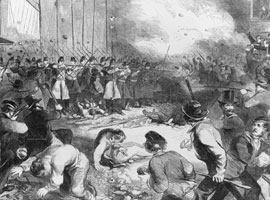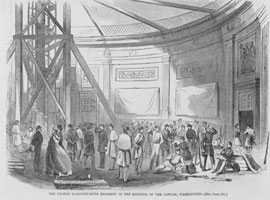7:49am EDT
'THE OTHER AMERICA'
Conceived: April 2nd, 1866
Gestated: July 15th, 2016
Born: January 6th, 2021
If you wish to ignore yesterday's profound actions within Congress, then you are simply doomed to be part of a most predictable event.
On this day of January 6th, 2021, you will experience a most aggressive and shocking moment in our nations history, never before experienced by anyone living on this earth at this moment.
______________________________
Welcome to___
'THE OTHER AMERICA'
When a nation comes to the brink of civil war, few individuals within the chaos stop to think: "what are my law of averages here?....based on historical facts, I mean?"
They are blinded by what has been handed down to them by their grandparents, their local politicians, their religious leaders or from the community in which they reside.
And who wants to be the one to tell their life-long friends, that they have all been duped by the questionable false-wisdom of their elders:
...That their 'belief system' is built on a series of lies, fantasy-folk-lore, illegitimate birth rights, genetic falsehoods and religious snake-oil-salesman-parlour-tricks.
Those who are the most egregious in their decent are the ones who will call themselves the most patriotic, the most qualified, the most intelligent people in the room.
When it comes to the future of everyone's hope, they are asking all of you to trust them unconditionally, as they will ask you to deny and denounce the ethics we live with, of the 'natural laws of humanity'.
__Fringe religions and political parties who deem their ethos as the true doctrine of humankind and that their 'law' circumvents all other 'natural laws,' are to be the most feared.
These parties are here... Now, in Washington D.C. in force.
They will ask you to believe in their 'Other Reality' their 'Other America.' The America that made it's bid for sovereignty in 1861 and left an eternal shame upon their states and their kind to this day.
A Civil War between two belief systems, is not something that grows over night. It usually takes decades if not centuries.
A dissatisfied faction, who wish to detach, subvert or crush their nemesis, must find their catalyst, their poster child: their epiphenous moment in history: to rally the 'on-the-fence-fringers__'
__To call out and join in the fight to bolster their ranks and hatch their glorious revolution that has laid in wait, tucked deep within their footlockers since May, 1865.
They have been waiting for their hero, their Napoleon, their Shaman, to hang their rebel flags from and the voters of America gave it to them on July 15th, 2016.
If the result of the 2016 election did not alarm most of you, If the subsequent folly that has unfolded within the chambers of government, the judicial system and throughout the societal climate of this nation has not caused you to note a significant event is upon this endangered democracy_ then you are doomed.
When it comes to domestic and world changing scenarios, I would like to point out that the rampant individualism, complacency, indifference or just plain ignorance that exists within a very large population of this country has brought us here.
We have convinced ourselves that our exclusive gifts of freedom and prosperity is a birth right and that these things we hold dear, will never be infringed upon or taken away by an angry fringe-nationalist-fundamentalist-mob of rebels.
With this being said, I have come to the conclusion, that unless an overt effort is spent to reverse the momentum these fringe-factions have gained within the chambers of Washington D.C.__
__It will be impossible to reverse the impending damage (which I predict) and prevent this country from falling into it's second Civil War within the next five years.
By the time the complacency of our citizenry wears off, this country now will realize that a tragically fatal event is about to fall upon them, and it will be too late.
Today, January 6th, 2021 will be the most aggressive day the 'Other America' forces have attempted to practice, since April 12th, 1861 and not until 'everyone' grasps this, this will continue to unfold according to 'their' plan until we reach the ugly inevitability of violent conflict.
The blog above was written 6 hours before the January 6th Insurrection 2021
________________________________________________
These individuals have no idea what they are helping create...
Is this the beginning of: 'The Other America'?
_____________________________________________
BELOW: A little background on how things went down in Washington D.C., 160 years ago.
The War Begins
Soon
after Lincoln took office, the commander of Fort Sumter in South
Carolina’s Charleston Harbor reported that supplies were running low.
Several members of the president’s cabinet recommended evacuating the
fort. Instead, the president chose to resupply it, but with food rather
than with weapons. At 4:40 a.m. on April 12, 1861, Confederate cannons
opened fire on Fort Sumter and Union forces surrendered 34 hours later.
The attack prompted President Lincoln to issue a proclamation on April
15 calling upon Congress to convene an emergency session on July 4. He
also called for 75,000 troops to protect the seat of government and
suppress the rebellion—although they were asked to serve for only 90
days.
The
response across the North to the president’s call was swift. As one
journalist recorded, Lincoln’s proclamation “was received with the
beating of drums and the ringing notes of the bugle, calling the
defenders of the capitol to their colors. Every city and hamlet had its
flag-raising.” Senator John Sherman of Ohio later described this
impressive reaction in his memoirs: “The response of the loyal states to
the call of Lincoln was perhaps the most remarkable uprising of a great
people in the history of mankind. Within a few days the road to
Washington was opened, but the men who answered the call were not
soldiers, but citizens, badly armed, and without drill or discipline.”
The first Union troops, volunteers from Pennsylvania, arrived in
Washington on April 18 and were quartered in the House wing of the
Capitol. The next to arrive was the Sixth Regiment from Massachusetts.
Having encountered angry mobs of Southern sympathizers in Baltimore, the
Massachusetts soldiers arrived in Washington on April 19 bloodied and
exhausted. They established their camp in the Senate Chamber. Longtime
Senate doorkeeper Isaac Bassett described the arrival of these embattled
troops:

The
Sixth Regiment of Massachusetts, nine hundred strong, under the command
of Col. Jones, were attacked in Baltimore on their way to Washington. .
. . On arriving here these were marched into the Capitol and
immediately occupied the Senate Chamber. . . . The col. made the Vice
President’s Room his headquarters. They looked tired I saw blood running
down their faces. Their clothes were full of dust. Everything was done
that could be for their comfort.
Soon
Washington was teeming with soldiers, thousands making their camp in
and around the Capitol. In a letter to his son on April 19, Architect of
the Capitol Thomas U. Walter commented that “the Capitol itself is
turned into a barracks; there will be 30,000 troops here by tomorrow
night.” Company E of the National Guard, a group formed from mechanics
who had been working in and around the Capitol, made their quarters in
the Revolutionary Claims Committee room. A young writer named Theodore
Winthrop of the Seventh New York Regiment documented his experience in
the Atlantic Monthly, published in July 1861. “Our life in the Capitol
was most dramatic and sensational . . . ” he wrote. “We joked, we
shouted, we sang, we mounted the Speaker’s desk and made speeches.”
Seated at the senators’ desks in the still-new chamber, soldiers used
Senate stationery and franked envelopes to correspond with their loved
ones back home. In the Capitol Rotunda, a reporter witnessed a young
member of the New York Zouaves, “a mere boy,” swing nearly 100 feet on a
rope from an interior cornice of the new dome. “It did not seem to be a
novel feat to the others, as they noticed it no more than any ordinary
occurrence,” the reporter remarked. One of the soldiers’ mock sessions
of the Senate was witnessed by a Washington correspondent for the
Providence Journal, who wrote:
The
presiding officer was just putting the question on a resolution
directing the sergeant-at-arms to proceed immediately to the White House
and to request the President, if, in his opinion not incompatible with
the public interest, to send down a gallon of his best brandy. A motion
to strike out the word “Brandy” and substitute “Old Rye” was voted down,
on constitutional grounds, and because the “Hon. Senator from South
Carolina” who offered it had both his legs on the desk, while the rules
only permitted one. And finally a motion was made to clear the galleries
as disorderly persons were looking on, evidently to ridicule the
proceedings and otherwise behaving in a manner not consistent with the
dignity of the Senate.

Despite
the levity of these reports, emotions ran high throughout the city. In
the Senate Chamber, incensed troops took their bayonets to the desk of
former senator Jefferson Davis, seeking to destroy an object once
occupied by the new leader of the Confederacy. Hearing the commotion,
Bassett rushed to stop the destruction of the desk, reminding the
soldiers that it belonged to the United States government, not Davis.
“You were put here to protect, and not to destroy!” he shouted. “They
stopped immediately and said I was right, they thought it belonged to
Jefferson Davis,” Bassett noted in his memoirs.
A
militant spirit prevailed when Congress met on July 4, 1861. The more
radical members pressed the administration for quick military action.
Rumors spread that President Lincoln had no intention of suppressing the
rebellion and was simply delaying in order to achieve a compromise with
the South. The radicals demanded a quick campaign aimed at the rebel
capital of Richmond. Despite the fact that northern troops remained
untrained and untested for battle, popular support grew for war. “On to
Richmond!” read the headline in the influential New York Tribune:
“Forward to Richmond! The Rebel Congress must not be allowed to meet
there.” The drumbeat of publicity persuaded Lincoln to launch an early
offensive.
On
Sunday, July 21, 1861, some members of Congress gathered in Centreville,
Virginia, about 30 miles from Washington, to watch the Union forces
march into battle at Bull Run. Civilians rode out in wagons and packed
picnic lunches to enjoy while watching the battle (thus known as the
“Picnic Battle”). As journalist Benjamin Perley Poore commented,
spectators gathered “as they would have gone to see a horse-race or to
witness a Fourth of July procession.” The Union army performed well in
the morning, but by early afternoon the Confederates brought in
reinforcements, staging an intense battle over a space known as Henry
Hill. When Union generals finally called retreat around 4:00 p.m., the
frightened soldiers fled for their lives, sweeping up civilians in their
retreat back to Washington.
Near
the battlefield, a group of senators were eating lunch. They heard a
loud noise and looked around to see the road filled with retreating
soldiers, horses, and wagons. “Turn back, turn back, we’re whipped,”
Union soldiers cried as they ran past the spectators. Startled, Michigan
senator Zachariah Chandler tried to block the road to stop the retreat.
Senator Benjamin Wade of Ohio, sensing a humiliating defeat, picked up a
discarded rifle and threatened to shoot any soldier who ran. While
Senator Henry Wilson of Massachusetts distributed sandwiches, a
Confederate shell destroyed his buggy, forcing him to escape on a stray
mule. Iowa senator James Grimes barely avoided capture and vowed never
to go near another battlefield. Dismayed, senators returned to
Washington to deliver eyewitness accounts to a stunned President
Lincoln. Only one member of Congress, New York representative Alfred
Ely, made it to Richmond that day—as a prisoner of war.
To read more: https://www.senate.gov/artandhistory/history/common/civil_war/WarBegins.htm
_________________________________________
It
is the collective obligation of humankind to ensure the peace and to
embolden ethical and moral deeds which protect the worlds civilizations
from the darkness. Unim Orbus Unim Veritas














